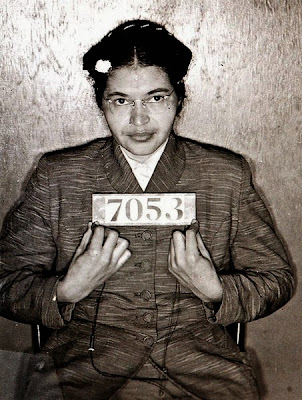Remembering Rosa Parks:

It’s March and that means it is Women’s History Month. This year I’d like to honor the remarkable women who have shaped our world. Among these amazing women stands Rosa Parks. The woman who said no. A woman whose quiet act of defiance sparked a revolution and reshaped the course of civil rights in America.
Born on February 4, 1913, in Tuskegee, Alabama, Rosa Louise McCauley Parks grew up amidst segregation and racial injustice. Despite facing discrimination from an early age, she was determined to challenge the status quo. In 1955, Parks was working as a seamstress in Montgomery, Alabama, when she encountered a pivotal moment that would cement her place in history.
On December 1, 1955, after a long day of work, Parks boarded a bus to head home. As the bus filled up, the driver ordered Parks and three other African American passengers to give up their seats to accommodate white passengers.
In Rosa Park’s Words…
“Are you going to stand up?” the driver demanded. Rosa Parks looked straight at him and said: “No.” The driver said, “Well, I’m going to have you arrested.” And Parks, still sitting next to the window, replied, “You may do that.”
While her companions complied, Parks refused to relinquish her seat. Her simple yet courageous act of defiance was a spark that ignited the Montgomery Bus Boycott, a pivotal moment in the Civil Rights Movement.
Parks’ arrest for violating segregation laws galvanized the African American community, leading to a mass boycott of the city’s bus system. The boycott, organized by civil rights leaders including Dr. Martin Luther King Jr., lasted for 381 days, putting economic pressure on the city and ultimately leading to the desegregation of Montgomery’s buses. This victory marked a significant milestone in the fight against racial segregation in the United States.
Rosa Parks after the boycott
Rosa Parks’ act of resistance did not only catalyze change in Montgomery; it reverberated across the nation. Her defiance brought national attention to the injustices faced by African Americans on a daily basis, galvanizing support for the Civil Rights Movement. Her bravery and steadfast commitment to equality inspired countless individuals to stand up against oppression and fight for justice.
Rosa Parks continued to be a tireless advocate for civil rights. She co-founded the Rosa and Raymond Parks Institute for Self-Development, aimed at educating young people about the importance of civil rights and social justice. Her legacy lives on as a beacon of hope and resilience, reminding us of the power of ordinary individuals to effect extraordinary change.
Rosa Parks’ courageous act not only changed the course of history but also paved the way for significant legal advancements in the fight against segregation. The Montgomery Bus Boycott led to a Supreme Court ruling in 1956, declaring segregation on public buses unconstitutional. This landmark decision marked a crucial victory in the battle for civil rights and set a precedent for future legal challenges to segregation laws.
I hope you enjoyed learning about Rosa Parks. I’m writing this series for my granddaughters, and all the other little girls out there who want to change the world. Rosa said no and the world changed. As I celebrate Women’s History Month, please let me know who your favorite trailblazer is.
Check back tomorrow for the next woman I feature for Women’s History Month.
Sign up for Kristy's Newsletter!
Get all the updates on upcoming books and events!




